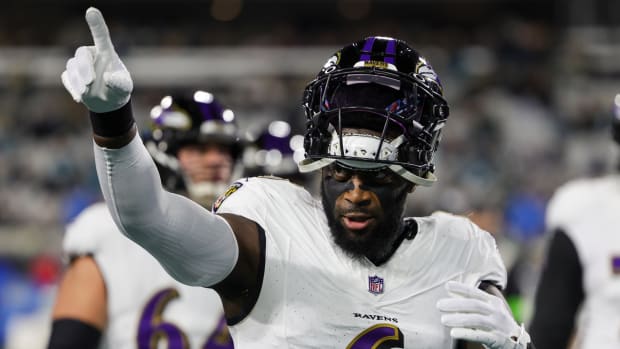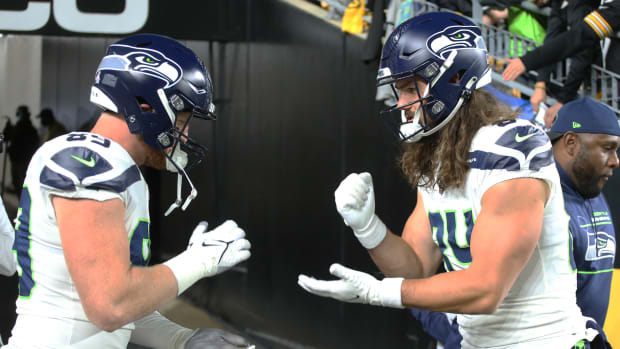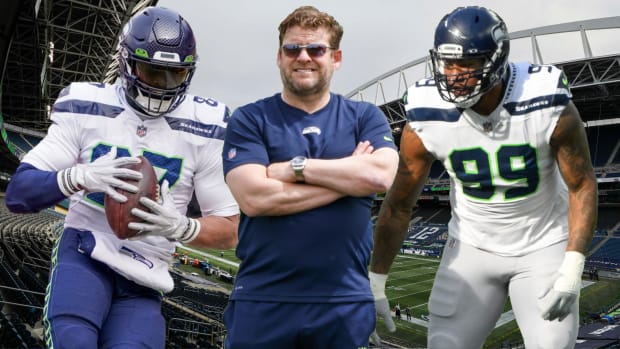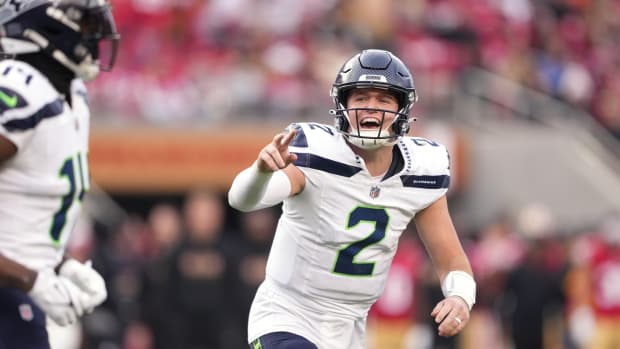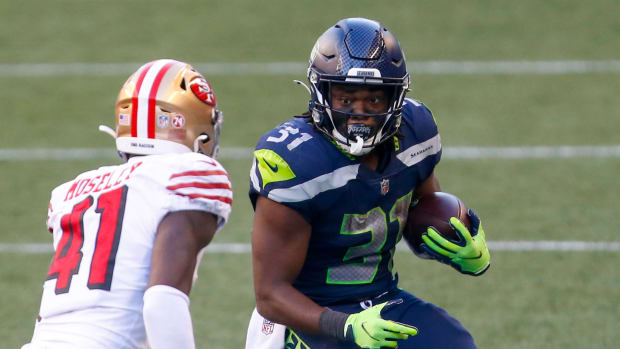With Brian Schottenheimer Out, Seahawks Face Tough Task Finding Upgrade
Midway through the fourth quarter in Saturday's Wild Card matchup at Lumen Field, immediately after running back Chris Carson was stuffed at the line of scrimmage on a 3rd and 1 run, Seahawks guard Damien Lewis took a knee and the medical staff rushed to tend to the injured player.
On the sidelines, as seen on the telecast, Pete Carroll shook his head, adjusted his mask, and continued a discussion on his headset. At the time, it could have speculated the gesture from the chronically positive head coach came out of frustration from not being able to pick up the first down or seeing one of his best offensive linemen shaken up on the field. But there was far, far more to the story behind the scenes.
With his team trailing the Rams by 10 points on the scoreboard and facing an early elimination from the postseason, Carroll's angst apparently wasn't for either one of those reasons. Preparing to go for it on fourth down from their own 34-yard line, he admitted on Monday he was "fighting the call a bit," indicating he didn't agree with the play call made by offensive coordinator Brian Schottenheimer. Despite the fact that Lewis' injury granted Seattle what amounted to a free timeout, the debate on the final play call led to Russell Wilson inexcusably breaking the huddle with just six seconds left on the play clock.
At the time, the Seahawks had all three of their timeouts available, but Carroll for some reason decided not to use one as the offense rushed up to the line of scrimmage. This latest textbook example of how not to manage the clock in a football game proved costly for the home team.
Scrambling to get off the pivotal snap, multiple linemen jumped early and guard Jordan Simmons ultimately was flagged for the false start. Wilson initially thought officials were going to reset the play clock and pleaded for such with officials, but that didn't happen and the penalty forced the Seahawks to punt with 9:32 remaining in the game.
"We were talking it over and we discussed some plays and I kind of got in the middle of it," Carroll said after the game. "Then, we just got late. That's why we wound up jumping; we screwed it up. It just wasn't clear enough. That's one play. We didn't function the way we needed to right there and so we had to punt the football."
Moments later, after D.J. Reed fumbled on a punt return, Jared Goff hit Robert Woods for a game-sealing 17-yard touchdown to extend the lead to 17 with under five minutes to play. Any hope for a comeback had been lost and suddenly, a 12-win NFC West champion would be transitioning into offseason mode way earlier than anticipated.
On its own, this particular sequence of clock management ineptitude didn't lose Saturday's game for the Seahawks. But in the aftermath of defeat, the explanation for the delay getting the call into Wilson revealed underlying trust issues that had developed over time between Carroll and Schottenheimer. While the head coach always has the ultimate authority, the fact the coordinator couldn't roll with his own call in such a key situation is damning.
With Schottenheimer and the Seahawks mutually parting ways due to "philosophical differences" just three days later, it's clear the relationship between Carroll and his coordinator was no longer a tenable one. And despite having an elite quarterback in Wilson along with several legitimate weapons on the outside, the reasons behind the split will make finding a quality replacement significantly more challenging.
Becoming hands-on with the offense isn't anything new for Carroll. He's a firm believer in a balanced offense capable of beating opponents both via the pass and the run. For years, to the frustration of some fans who wanted to see the passing game featured more extensively, Seattle beat up on opponents with a ground-and-pound, play action-heavy oriented attack with great success.
But in 2020, Carroll allowed Schottenheimer to "Let Russ Cook," and the early results were historically impressive. Wilson threw 28 touchdown passes in the first eight games and the Seahawks scored at least 30 points in all but one of those contests while racing out to a 6-2 start. They were averaging more than 34 points per game heading into the second half.
Then, everything changed. Wilson threw four interceptions in back-to-back losses to the Bills and Rams, leading Carroll to once again intervene. In part due to facing better defenses in the back half of the schedule, a more conservative approach ensued with winning the turnover battle the primary focus and on numerous occasions, Carroll opined for the run game to become a bigger focus.
But that didn't happen. Despite slogging through a difficult second half with just 12 touchdown passes in the final eight games, Schottenheimer continued to dial up passes. Wilson still attempted nearly 33 passes per game in the final eight games, but his yards per attempt dipped more than two full yards and passer rating plummeted by nearly 30 points. He also absorbed 23 sacks behind an offensive line that dealt with multiple injuries and wasn't as crisp in pass protection in the final two months.
As a result of the aforementioned factors, the Seahawks' per-game scoring average sank to 23.1 points per game. They were held to 20 or fewer points in four of the final eight games and despite winning six of their last seven, those struggles carried over into the playoffs as Wilson completed just 40 percent of his passes and the offense was again held to just 20 points in a Wild Card defeat.
Through it all, unable to sustain drives and battling persistent issues falling behind the sticks throughout the final two-plus months of the season, the Seahawks could never establish their run game quite as Carroll wanted. Carson never received more than 17 carries in a single game and after having seven games with 30-plus carries in 2019, the team only had four such games this year. Further highlighting the issue of getting their backs enough touches, Wilson had more carries than he's had since 2017 to skew the numbers.
"We need to run more with focus and direction and count on it a little bit differently that we did," Carroll explained on Monday. "It isn't going to be 50 runs a game, we're not doing that. I don't want to do that. I want to explode with the throwing game, but we need to dictate the way we're being played better."
Unhappy with the lack of balance, there's no doubt Carroll's desire to get back to running the football collided with Schottenheimer's visions for the offense revolving around Wilson. Considering how much Wilson and the unit as a whole struggled at the tail end of the season, maybe this was the right move - and the only move - that could be made by Seattle. A strong argument can be made the team did lean too much on the passing game and didn't make the necessary adaptations to keep the aerial attack soaring in the second half.
But given Carroll's history of meddling with the offense, any prospective replacement has to be prepared to cater their scheme to his philosophical vision, particularly when it comes to running the ball. They will be doing so following up a coordinator whose offense set a franchise record for points scored last season and finished in the top 10 each of his three seasons at the helm, and yet, wasn't deemed good enough.
Unfortunately, whether fair or not, that lack of autonomy could turn away potential game-changing candidates who don't want the head coach stepping on their toes and impeding them from doing their job to the best of their ability. While this should be a coveted position with the lure of coaching talents such as Wilson or DK Metcalf for a franchise that consistently makes the playoffs, Carroll's reach as well as the pressure associated with conducting the offense his way may make it far less desirable.
